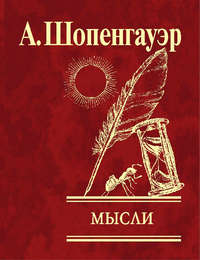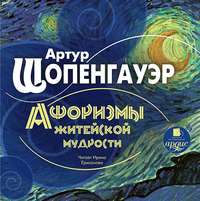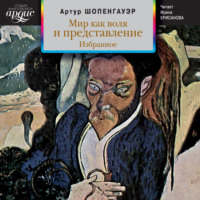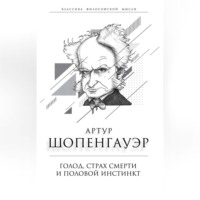 полная версия
полная версияThe World as Will and Idea (Vol. 2 of 3)
There are still a few points in the further course of the transcendental analytic which I should have to refute were it not that I am afraid of trying the patience of the reader; I therefore leave them to his own reflection. But ever anew in the “Critique of Pure Reason” we meet that principal and fundamental error of Kant's, which I have copiously denounced above, the complete failure to distinguish abstract, discursive knowledge from intuitive. It is this that throws a constant obscurity over Kant's whole theory of the faculty of knowledge, and never allows the reader to know what he is really speaking about at any time, so that instead of understanding, he always merely conjectures, for he alternately tries to understand what is said as referring to thought and to perception, and remains always in suspense. In the chapter “On the Division of all Objects into Phenomena and Noumena,” Kant carries that incredible want of reflection as to the nature of the idea of perception and the abstract idea, as I shall explain more fully immediately, so far as to make the monstrous assertion that without thought, that is, without abstract conceptions, there is no knowledge of an object; and that perception, because it is not thought, is also not knowledge, and, in general, is nothing but a mere affection of sensibility, mere sensation! Nay, more, that perception without conception is absolutely void; but conception without perception is yet always something (p. 253; V. 309). Now this is exactly the opposite of the truth; for concepts obtain all significance, all content, only from their relation to ideas of perception, from which they have been abstracted, derived, that is, constructed through the omission of all that is unessential: therefore if the foundation of perception is taken away from them, they are empty and void. Perceptions, on the contrary, have in themselves immediate and very great significance (in them, indeed, the thing in itself objectifies itself); they represent themselves, express themselves, have no mere borrowed content like concepts. For the principle of sufficient reason governs them only as the law of causality, and determines as such only their position in space and time; it does not, however, condition their content and their significance, as is the case with concepts, in which it appears as the principle of the ground of knowing. For the rest, it looks as if Kant really wished here to set about distinguishing the idea of perception and the abstract idea. He objects to Leibnitz and Locke that the former reduced everything to abstract ideas, and the latter everything to ideas of perception. But yet he arrives at no distinction; and although Locke and Leibnitz really committed these errors, Kant himself is burdened with a third error which includes them both – the error of having so mixed up knowledge of perception and abstract knowledge that a monstrous hybrid of the two resulted, a chimera of which no distinct idea is possible, and which therefore necessarily only confused and stupefied students, and set them at variance.
Certainly thought and perception are separated more in the chapter referred to “On the Division of all Objects into Phenomena and Noumena” than anywhere else, but the nature of this distinction is here a fundamentally false one. On p. 253; V. 309, it is said: “If I take away all thought (through the categories) from empirical knowledge, there remains absolutely no knowledge of an object, for through mere perception nothing at all is thought, and that this affection of sensibility is in me establishes really no relation of such ideas to any object.” This sentence contains, in some degree, all the errors of Kant in a nutshell; for it brings out clearly that he has falsely conceived the relation between sensation, perception, and thought, and accordingly identifies the perception, whose form he yet supposes to be space, and indeed space in all its three dimensions, with the mere subjective sensation in the organs of sense, but only allows the knowledge of an object to be given through thought, which is different from perception. I, on the contrary, say: Objects are first of all objects of perception, not of thought, and all knowledge of objects is originally and in itself perception. Perception, however, is by no means mere sensation, but the understanding is already active in it. The thought, which is added only in the case of men, not in the case of the brutes, is mere abstraction from perception, gives no fundamentally new knowledge, does not itself establish objects which were not before, but merely changes the form of the knowledge already won through perception, makes it abstract knowledge in concepts, whereby its concrete or perceptible character is lost, but, on the other hand, combination of it becomes possible, which immeasurably extends the range of its applicability. The material of our thought is, on the other hand, nothing else than our perceptions themselves, and not something which the perceptions did not contain, and which was added by the thought; therefore the material of everything that appears in our thought must be capable of verification in our perception, for otherwise it would be an empty thought. Although this material is variously manipulated and transformed by thought, it must yet be capable of being reduced to perception, and the thought traced back to this – just as a piece of gold can be reduced from all its solutions, oxides, sublimates, and combinations, and presented pure and undiminished. This could not happen if thought itself had added something, and, indeed, the principal thing, to the object.
The whole of the chapter on the Amphiboly, which follows this, is merely a criticism of the Leibnitzian philosophy, and as such is on the whole correct, though the form or pattern on which it is constructed is chosen merely for the sake of architectonic symmetry, which here also is the guiding clue. Thus, to carry out the analogy with the Aristotelian Organon, a transcendental Topic is set up, which consists in this, that every conception is to be considered from four points of view, in order to make out to which faculty of knowledge it belongs. But these four points of view are quite arbitrarily selected, and ten others might be added to them with just as much right; but their fourfold number corresponds to the titles of the categories, and therefore the chief doctrine of Leibnitz is divided among them as best it may be. By this critique, also, to some extent, certain errors are stamped as natural to the reason, whereas they were merely false abstractions of Leibnitz's, who, rather than learn from his great philosophical contemporaries, Spinoza and Locke, preferred to serve up his own strange inventions. In the chapter on the Amphiboly of Reflection it is finally said that there may possibly be a kind of perception entirely different from ours, to which, however, our categories are applicable; therefore the objects of that supposed perception would be noumena, things which can only be thought by us; but since the perception which would give that thought meaning is wanting to us, and indeed is altogether quite problematical, the object of that thought would also merely be a wholly indefinite possibility. I have shown above by quotations that Kant, in utter contradiction with himself, sets up the categories now as the condition of knowledge of perception, now as the function of merely abstract thought. Here they appear exclusively in the latter sense, and it seems quite as if he wished to attribute them merely to discursive thought. But if this is really his opinion, then necessarily at the beginning of the Transcendental Logic, before specifying the different functions of thought at such length, he was necessarily bound to characterise thought in general, and consequently to distinguish it from perception; he ought to have shown what knowledge is given by mere perception, and what that is new is added by thought. Then we would have known what he was really speaking about; or rather, he would then have spoken quite differently, first of perception, and then of thought; instead of which, as it is, he is always dealing with something between the two, which is a mere delusion. There would not then be that great gap between the transcendental Æsthetic and the transcendental Logic, where, after the exposition of the mere form of perception, he simply dismisses its content, all that is empirically apprehended, with the phrase “It is given,” and does not ask how it came about, whether with or without understanding; but, with one spring, passes over to abstract thought; and not even to thought in general, but at once to certain forms of thought, and does not say a word about what thought is, what the concept is, what is the relation of abstract and discursive to concrete and intuitive, what is the difference between the knowledge of men and that of brutes, and what is reason.
Yet it was just this distinction between abstract knowledge and knowledge of perception, entirely overlooked by Kant, which the ancients denoted by φαινομενα and νοουμενα,7 and whose opposition and incommensurability occupied them so much in the philosophemes of the Eleatics, in Plato's doctrine of Ideas, in the dialectic of the Megarics, and later the Scholastics in the controversy between Nominalism and Realism, the seed of which, so late in developing, was already contained in the opposite mental tendencies of Plato and Aristotle. But Kant, who, in an inexcusable manner, entirely neglected the thing to denote which the words φαινομενα and νοουμενα had already been taken, took possession of the words, as if they were still unappropriated, in order to denote by them his thing in itself and his phenomenon.
Since I have been obliged to reject Kant's doctrine of the categories, just as he rejected that of Aristotle, I wish here to indicate as a suggestion a third way of reaching what is aimed at. What both Kant and Aristotle sought for under the name of the categories were the most general conceptions under which all things, however different, must be subsumed, and through which therefore everything that exists would ultimately be thought. Just on this account Kant conceived them as the forms of all thought.
Grammar is related to logic as clothes to the body. Should not, therefore, these primary conceptions, the ground-bass of the reason, which is the foundation of all special thought, without whose application, therefore, no thought can take place, ultimately lie in those conceptions which just on account of their exceeding generality (transcendentalism) have their expression not in single words, but in whole classes of words, because one of them is thought along with every word whatever it may be, whose designation would therefore have to be looked for, not in the lexicon but in the grammar? In fact, should they not be those distinctions of conceptions on account of which the word which expresses them is either a substantive or an adjective, a verb or an adverb, a pronoun, a preposition, or some other particle – in short, the parts of speech? For undoubtedly these denote the forms which all thought primarily assumes, and in which it directly moves; accordingly they are the essential forms of speech, the fundamental constituent elements of every language, so that we cannot imagine any language which would not consist of at least substantives, adjectives, and verbs. These fundamental forms would then have subordinated to them those forms of thought which are expressed through their inflections, that is, through declension and conjugation, and it is unessential to the chief concern whether in denoting them we call in the assistance of the article and the pronoun. We will examine the thing, however, somewhat more closely, and ask the question anew: What are the forms of thought?
(1.) Thought consists throughout of judging; judgments are the threads of its whole web, for without making use of a verb our thought does not move, and as often as we use a verb we judge.
(2.) Every judgment consists in the recognition of the relation between subject and predicate, which it separates or unites with various restrictions. It unites them from the recognition of the actual identity of the two, which can only happen in the case of synonyms; then in the recognition that the one is always thought along with the other, though the converse does not hold – in the universal affirmative proposition; up to the recognition that the one is sometimes thought along with the other, in the particular affirmative proposition. The negative propositions take the opposite course. Accordingly in every judgment the subject, the predicate, and the copula, the latter affirmative or negative, must be to be found; even although each of these is not denoted by a word of its own, as is however generally the case. The predicate and the copula are often denoted by one word, as “Caius ages;” sometimes one word denotes all three, as concurritur, i. e., “the armies engage.” From this it is evident that the forms of thought are not to be sought for precisely and directly in words, nor even in the parts of speech, for even in the same language the same judgment may be expressed in different words, and indeed in different parts of speech, yet the thought remains the same, and consequently also its form; for the thought could not be the same if the form of thought itself were different. But with the same thought and the same form of thought the form of words may very well be different, for it is merely the outward clothing of the thought, which, on the other hand, is inseparable from its form. Thus grammar only explains the clothing of the forms of thought. The parts of speech can therefore be deduced from the original forms of thought themselves which are independent of all language; their work is to express these forms of thought in all their modifications. They are the instrument and the clothing of the forms of thought, and must be accurately adapted to the structure of the latter, so that it may be recognised in them.
(3.) These real, unalterable, original forms of thought are certainly those of Kant's logical table of judgments; only that in this table are to be found blind windows for the sake of symmetry and the table of the categories; these must all be omitted, and also a false arrangement. Thus: —
(a.) Quality: affirmation and negation, i. e., combination and separation of concepts: two forms. It depends on the copula.
(b.) Quantity: the subject-concept is taken either in whole or in part: totality or multiplicity. To the first belong also individual subjects: Socrates means “all Socrateses.” Thus two forms. It depends on the subject.
(c.) Modality: has really three forms. It determines the quality as necessary, actual, or contingent. It consequently depends also on the copula.
These three forms of thought spring from the laws of thought of contradiction and identity. But from the principle of sufficient reason and the law of excluded middle springs —
(d.) Relation. It only appears if we judge concerning completed judgments, and can only consist in this, that it either asserts the dependence of one judgment upon another (also in the plurality of both), and therefore combines them in the hypothetical proposition; or else asserts that judgments exclude each other, and therefore separates them in the disjunctive proposition. It depends on the copula, which here separates or combines the completed judgments.
The parts of speech and grammatical forms are ways of expressing the three constituent parts of the judgment, the subject, the predicate, and the copula, and also of the possible relations of these; thus of the forms of thought just enumerated, and the fuller determinations and modifications of these. Substantive, adjective, and verb are therefore essential fundamental constituent elements of language in general; therefore they must be found in all languages. Yet it is possible to conceive a language in which adjective and verb would always be fused together, as is sometimes the case in all languages. Provisionally it may be said, for the expression of the subject are intended the substantive, the article, and the pronoun; for the expression of the predicate, the adjective, the adverb, and the preposition; for the expression of the copula, the verb, which, however, with the exception of the verb to be, also contains the predicate. It is the task of the philosophy of grammar to teach the precise mechanism of the expression of the forms of thought, as it is the task of logic to teach the operations with the forms of thought themselves.
Note.– As a warning against a false path and to illustrate the above, I mention S. Stern's “Vorläufige Grundlage zur Sprachphilosophie,” 1835, which is an utterly abortive attempt to construct the categories out of the grammatical forms. He has entirely confused thought with perception, and therefore, instead of the categories of thought, he has tried to deduce the supposed categories of perception from the grammatical forms, and consequently has placed the grammatical forms in direct relation to perception. He is involved in the great error that language is immediately related to perception, instead of being directly related only to thought as such, thus to the abstract concepts, and only by means of these to perception, to which they, however, have a relation which introduces an entire change of the form. What exists in perception, thus also the relations which proceed from time and space, certainly becomes an object of thought; thus there must also be forms of speech to express it, yet always merely in the abstract, as concepts. Concepts are always the primary material of thought, and the forms of logic are always related to these, never directly to perception. Perception always determines only the material, never the formal truth of the proposition, for the formal truth is determined according to the logical rules alone.
I return to the Kantian philosophy, and come now to the Transcendental Dialectic. Kant opens it with the explanation of reason, the faculty which is to play the principal part in it, for hitherto only sensibility and understanding were on the scene. When considering his different explanations of reason, I have already spoken above of the explanation he gives here that “it is the faculty of principles.” It is now taught here that all the a priori knowledge hitherto considered, which makes pure mathematics and pure natural science possible, affords only rules, and no principles; because it proceeds from perceptions and forms of knowledge, and not from mere conceptions, which is demanded if it is to be called a principle. Such a principle must accordingly be knowledge from pure conceptions and yet synthetical. But this is absolutely impossible. From pure conceptions nothing but analytical propositions can ever proceed. If conceptions are to be synthetically and yet a priori combined, this combination must necessarily be accomplished by some third thing, through a pure perception of the formal possibility of experience, just as synthetic judgments a posteriori are brought about through empirical perception; consequently a synthetic proposition a priori can never proceed from pure conceptions. In general, however, we are a priori conscious of nothing more than the principle of sufficient reason in its different forms, and therefore no other synthetic judgments a priori are possible than those which proceed from that which receives its content from that principle.
However, Kant finally comes forward with a pretended principle of the reason answering to his demand, yet only with this one, from which others afterwards follow as corollaries. It is the principle which Chr. Wolf set up and explained in his “Cosmologia,” sect. i. c. 2, § 93, and in his “Ontologia,” § 178. As now above, under the title of the Amphiboly, mere Leibnitzian philosophemes were taken for natural and necessary aberrations of the reason, and were criticised as such, so here precisely the same thing happens with the philosophemes of Wolf. Kant still presents this principle of the reason in an obscure light, through indistinctness, indefiniteness, and breaking of it up (p. 307; V. 361, and 322; V. 379). Clearly expressed, however, it is as follows: “If the conditioned is given, the totality of its conditions must also be given, and therefore also the unconditioned, through which alone that totality becomes complete.” We become most vividly aware of the apparent truth of this proposition if we imagine the conditions and the conditioned as the links of a suspended chain, the upper end of which, however, is not visible, so that it might extend ad infinitum; since, however, the chain does not fall, but hangs, there must be above one link which is the first, and in some way is fixed. Or, more briefly: the reason desires to have a point of attachment for the causal chain which reaches back to infinity; it would be convenient for it. But we will examine the proposition, not in figures, but in itself. Synthetic it certainly is; for, analytically, nothing more follows from the conception of the conditioned than that of the condition. It has not, however, a priori truth, nor even a posteriori, but it surreptitiously obtains its appearance of truth in a very subtle way, which I must now point out. Immediately, and a priori, we have the knowledge which the principle of sufficient reason in its four forms expresses. From this immediate knowledge all abstract expressions of the principle of sufficient reason are derived, and they are thus indirect; still more, however, is this the case with inferences or corollaries from them. I have already explained above how abstract knowledge often unites a variety of intuitive cognitions in one form or one concept in such a way that they can no longer be distinguished; therefore abstract knowledge stands to intuitive knowledge as the shadow to the real objects, the great multiplicity of which it presents through one outline comprehending them all. Now the pretended principle of the reason makes use of this shadow. In order to deduce from the principle of sufficient reason the unconditioned, which directly contradicts it, it prudently abandons the immediate concrete knowledge of the content of the principle of sufficient reason in its particular forms, and only makes use of abstract concepts which are derived from it, and have value and significance only through it, in order to smuggle its unconditioned somehow or other into the wide sphere of those concepts. Its procedure becomes most distinct when clothed in dialectical form; for example, thus: “If the conditioned exists, its condition must also be given, and indeed all given, thus completely, thus the totality of its conditions; consequently, if they constitute a series, the whole series, consequently also its first beginning, thus the unconditioned.” Here it is false that the conditions of a conditioned can constitute a series. Rather must the totality of the conditions of everything conditioned be contained in its nearest ground or reason from which it directly proceeds, and which is only thus a sufficient ground or reason. For example, the different determinations of the state which is the cause, all of which must be present together before the effect can take place. But the series, for example, the chain of causes, arises merely from the fact that we regard what immediately before was the condition as now a conditioned; but then at once the whole operation begins again from the beginning, and the principle of sufficient reason appears anew with its claim. But there can never be for a conditioned a properly successive series of conditions, which exist merely as such, and on account of that which is at last conditioned; it is always an alternating series of conditioneds and conditions; as each link is laid aside the chain is broken, and the claim of the principle of sufficient reason entirely satisfied, it arises anew because the condition becomes the conditioned. Thus the principle of sufficient reason always demands only the completeness of the immediate or next condition, never the completeness of a series. But just this conception of the completeness of the condition leaves it undetermined whether this completeness should be simultaneous or successive; and since the latter is chosen, the demand now arises for a complete series of conditions following each other. Only through an arbitrary abstraction is a series of causes and effects regarded as a series of causes alone, which exists merely on account of the last effect, and is therefore demanded as its sufficient reason. From closer and more intelligent consideration, and by rising from the indefinite generality of abstraction to the particular definite reality, it appears, on the contrary, that the demand for a sufficient reason extends only to the completeness of the determinations of the immediate cause, not to the completeness of a series. The demand of the principle of sufficient reason is completely extinguished in each sufficient reason given. It arises, however, immediately anew, because this reason is again regarded as a consequent; but it never demands directly a series of reasons. If, on the other hand, instead of going to the thing itself, we confine ourselves to the abstract concepts, these distinctions vanish. Then a chain of alternating causes and effects, or of alternating logical reasons and consequents, is given out as simply a chain of causes of the last effect, or reasons of the last consequent, and the completeness of the conditions, through which alone a reason becomes sufficient, appears as the completeness of that assumed series of reasons alone, which only exist on account of the last consequent. There then appears the abstract principle of the reason very boldly with its demand for the unconditioned. But, in order to recognise the invalidity of this claim, there is no need of a critique of reason by means of antinomies and their solution, but only of a critique of reason understood in my sense, an examination of the relation of abstract knowledge to direct intuitive knowledge, by means of ascending from the indefinite generality of the former to the fixed definiteness of the latter. From such a critique, then, it here appears that the nature of the reason by no means consists in the demand for an unconditioned; for, whenever it proceeds with full deliberation, it must itself find that an unconditioned is an absurdity. The reason as a faculty of knowledge can always have to do only with objects; but every object for the subject is necessarily and irrevocably subordinated to the principle of sufficient reason, both a parte ante and a parte post. The validity of the principle of sufficient reason is so involved in the form of consciousness that we absolutely cannot imagine anything objective of which no why could further be demanded; thus we cannot imagine an absolute absolute, like a blind wall in front of us. That his convenience should lead this or that person to stop at some point, and assume such an absolute at pleasure, is of no avail against that incontestable certainty a priori, even if he should put on an air of great importance in doing so. In fact, the whole talk about the absolute, almost the sole theme of philosophies since Kant, is nothing but the cosmological proof incognito. This proof, in consequence of the case brought against it by Kant, deprived of all right and declared outlawed, dare no longer show itself in its true form, and therefore appears in all kinds of disguises – now in distinguished form, concealed under intellectual intuition or pure thought; now as a suspicious vagabond, half begging, half demanding what it wants in more unpretending philosophemes. If an absolute must absolutely be had, then I will give one which is far better fitted to meet all the demands which are made on such a thing than these visionary phantoms; it is matter. It has no beginning, and it is imperishable; thus it is really independent, and quod per se est et per se concipitur; from its womb all proceeds, and to it all returns; what more can be desired of an absolute? But to those with whom no critique of reason has succeeded, we should rather say —









